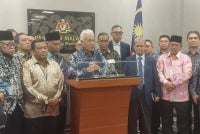Boosting education effectiveness, expert calls for locally focused curriculum
"The fundamental principle is to create solutions that are specific to our circumstances."
SHARIFAH SHAHIRAH
SHAH ALAM - An educational expert stresses the importance of customising curriculum development to align with local standards and cultural values.
Therefore, Prof Datuk Dr Ishak Haron said that adopting this approach would markedly enhance the effectiveness of the education system, as opposed to simply replicating methods from other countries that might be unsuitable or less effective in our context.
“We have the capability to develop our own methods tailored to our unique needs and context. The fundamental principle is to create solutions that are specific to our circumstances.
“We should refrain from adopting or borrowing methods from countries like Singapore, Vietnam or the UK,” he said when contacted recently.
He highlighted that while it might work for them, it was essential to consider our own standards and culture.
Drawing from his experience in the US education system, he highlighted the incompatibility of directly adopting their textbooks for our education system.
Ishak emphasised the importance for Malaysia to grasp the context of other countries and develop our own textbooks in alignment with our curriculum.
Adaptation to our education system was key he highlighted, and this requires thorough understanding rather than mere replication.
He stressed his desire for educators not to feel restricted by methods from a single country.
Specifically, in the scenario discussed previously, he said the aim was to teach Malay and English within Malaysia's unique context.
"We can implement this with stronger methods tailored to our strengths. From there, we can expect significant improvements," he added.
Recently, the report "Bending Bamboo Shoots: Strengthening Foundation Skills" by World Bank report revealed that Malaysian students by age 15 lag behind peers from Hong Kong, China, Japan, and Singapore in reading, science, and mathematics.
Furthermore, 42 per cent of Malaysian students failed to achieve reading proficiency by age 11, with lower-income families facing a more significant challenge, where 61 per cent lack reading proficiency.
In the meantime, 24 per cent of Malaysian children starting primary school at age seven lack school-readiness skills due to a lack of preschool education, with 10 per cent of children aged four to six not having access to preschool.
The report recommends expanding access to quality preschool education, implementing standardised learning assessments, and providing ongoing teacher professional development based on international best practices.
The World Bank suggests enhancing Malaysia's early childhood learning program while recognising the country's progress in expanding preschool education.
Download Sinar Daily application.Click Here!














